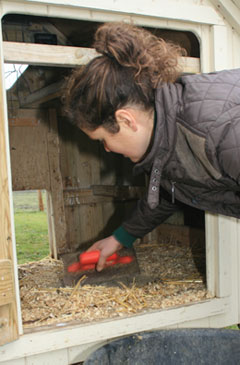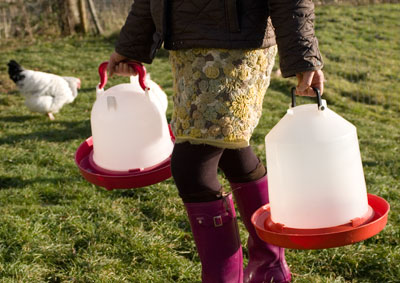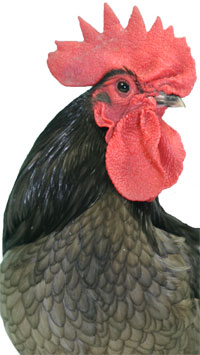Stress is a major contributor to ill health in chickens and can also make them more prone to a number of vices such as feather picking, egg eating, comb or vent pecking.
Chickens kept in intensive conditions are constantly subjected to stress which is why farmers see such high mortality rates and have to pay out to keep birds healthy and make them productive. Fortunately, keeping chickens in our back garden isn’t exactly intensive as long as they have a sufficiently large run or are let out of their run regularly to free-range although there are pleanty of other times when chickens can suffer from stress.
In short, stress is best avoided whenever possible and a little bit of care and forethought can dramatically reduce stress in your birds.
So how do we know what stresses chickens? Well, some years ago, there were studies done that measured the stress hormone ‘corticosterone’ of birds in different situations and it is this research that has enabled us to understand the stressors.
Stressors.
As well as intensive conditions causing stress, the other main stressors can seem quite trivial to us.
- Handling. This is one of the biggest stressors. Chickens are a prey species so naturally, if caught and picked up, they become stressed. Whilst regular handling is important for health checks, chasing a bird around a run for 5 minutes every time will not help. Try to catch birds in a confined area such as a house quickly and calmly. Hold the wings firmly and then transfer the bird to the holding position with your right hand underneath her, breast in the palm of your hand, fingers holding the tops of the legs. Her head should be underneath your arm so her head is looking behind you. Use your left hand to examine her.
- Introducing new chickens. Chickens are flock animals that have a pecking order. It is thought the ancestors to our chickens, the Red Jungle Fowl of South East Asia use the pecking order to assist in their survival. If every bird has her place, when it comes to feeding time, each one can have her turn and they don’t have to spend precious time arguing which may alert predators to their where-abouts. Every hen knows her place in the pecking order and by introducing new birds, the pecking order is upset. No hen knows where she stands and this will cause arguments and considerable stress for days until they have sorted themselves out into a ‘new flock’.
- Lack of food or water. This stress is completely avoidable of course but we all have those one off days when we suddenly realise that our birds have run out of water for one reason or another. A leaky water container, frozen water or just a forgetful moment!
- Extreme heat. Chickens don’t sweat. To cool down, a chicken must either take on cool water (and excrete more to lose the excess fluids and some heat) or pant which removes heat through the air they exhale. Chickens are much better equipped to deal with the cold and can keep their body temperature up by eating more and trapping air inside their feathers to insulate themselves thermally. Heat will cause chickens to become stressed.
- A new environment. This can be taking a bird to a show, getting your birds for the first time or just moving them to a different house or run. Another environmental change that is hard to avoid but causes considerable stress for your birds is when there has been a covering of snow.
- Egg laying. This is surprising since this is a natural things that chickens do but egg laying does cause stress on your hens. Giving them a peaceful, private, darkened nest box can help. Try not to disturb hens that are in the process of laying.
- Predation. Foxes or other predators visiting the garden on a regular basis are likely to cause stress. In the extreme case, after a fox attack, even though a chicken may survive the wounds inflicted by a fox (he grabs a mouth full of her feathers for example and the chicken escapes), she can still die because of the stress.

If you can minimise stress, your birds will be less prone to picking up disease which is something we would all like: happy, healthy chickens!






Hi
I keep 26 chickens of various breeds on my allotment,can you advise how many cockerels would be the right balance for my flock
Regards Dave
You can have 2 – but they would need a lot of space and need to be fairly docile. During the breeding season you would probably have to separate them to stop fighting. I would have one and if you wanted to breed, either accept that he might not make it around all of the hens, or separate him and a smaller number of hens for a week or two whilst collecting the eggs for incubation. 15 is a good number of hens for an active cock.
My cock was doing very well with his new flock of battery hens, when they started pecking out his feathers and attacking his feet. Has removed him for his own protection, he can still see the giels as he is beside them, but when I tried to reintroduce him after his injuries had healed they instantly cornered him and attacked again. Any suggestions?
This is unusual. Normally a cock is bigger and instantly takes the head of the pecking order. It seems they see him as a subordinate and are bullying him.
The one thought I have is that it is unusual for them to peck the feet. Normally they go for the vulnerable areas such as the head.
You could try giving them a bigger area with more distractions (free range?) this usually helps with bullying because he victim can get away more easily and can keep his distance. If he is a cockerel (under 1 year) he won’t have fully matured so can be a bit of a wimp at first.
I don’t know what to do exactly I’m sorry. My only other thought is to find a stronger cock who will be able to take the head of the pecking order.
We have 2 – 4H poultry birds (a silver laced Wyandotte & a new Hampshire red, both bantams) and 6 chicks (pullets of mixed breeds for egg production only). We took the silver laced Wyandotte to a 4H field day show today and she died in my son’s arms 🙁 We are now trying to figure out what happened to prevent this from EVER happening again as it was horrible watching him experience this. She was about 1.5 years old and in seemingly good health. I noticed her panting both last night as he was practicing with her and washing her and yet again today. It was not hot at all (as it was only 930am this morning), she didn’t seem ill or upset or anything. We are relatively new to 4H Poultry (my only experience was with large animals). We ended up taking her to our vet to be cremated because it was the easiest for my son to deal with. Any thoughts on what could have happened, how to prevent it, what I possibly need to check our other chickens for????? Thanks
This is unusual, although whatever it was, the stress of moving her to the show seemed to be the final straw.
Shows are stressful for chickens and they should always be in tip top condition when you take them but the biggest problem is knowing that they are in good health because being predated upon in the wild, chickens hide their illnesses until the last moments.
Hello,
I have found this site really helpful in setting up our new hen house and run. We are completely new to this so any help is gratefully accepted. We have 3 hybrid hens, 1 Bluebell and two Jasmine, they seem to have sorted out their pecking order, (we are in our 2nd week). 2 of the hens have a lovely temperament and are easy to handle, but one of the Jasmines is very nervous and runs away. She is also constantly pecking and spiteful towards the Bluebell. I am trying to handle them daily to get them used to me, and the others seem happy as Larry. Also she does not have a comb on her head and is thinner in appearance to the others.
Hi – I’m new to keeping chickens (10 days new) I have 3 hybrid hens – one of whom I am very worried about. Yesterday my normally dominant hen ‘Rhonda’ became very subdued, tail dropped, wasn’t eating, didn’t lay at her normal time in the morning. By the evening she was quite listless, I put her in coop and when I checked on her she had laid a soft egg. Really just membrane on the outside. This morning there was a pinkish ‘blob’ in her poo. I have also noticed she does a lot of yellowy runny poos (also normal poos). I hadn’t been too worried about the poo before as she seemed so healthy – was eating well, running around and laying like clockwork. The only other symptom I have noticed is a few white patches in her brown feathers. This morning she is up and perky eating and drinking and bossing the other two around. I am worried she might have an infection or egg peritonitis? (Following consultations with (hen) Dr Google!) my closest avain vet is 70miles away so not keen to put her through that either.
Any advice would be welcomed!
I’m sorry I don’t know what could be wrong with her. The symptoms can occur with many different problems she might be experiencing. A vet is really the only route I can suggest for her, she sounds quite sick.